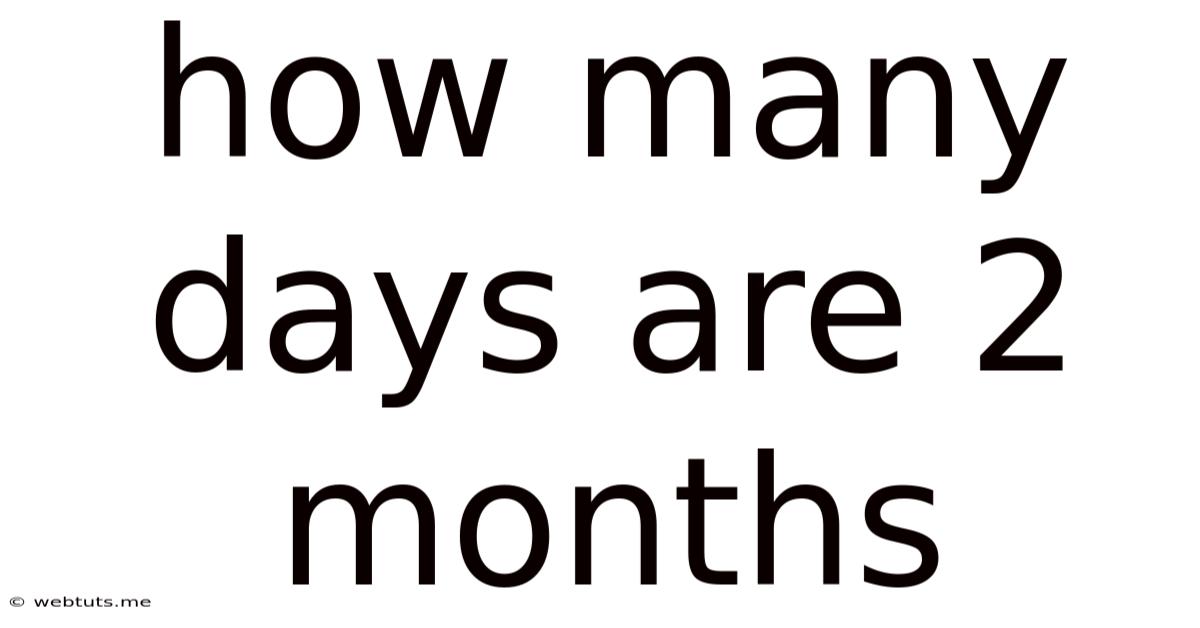How Many Days Are 2 Months
Webtuts
May 12, 2025 · 4 min read

Table of Contents
How Many Days Are in 2 Months? A Comprehensive Guide
Determining the number of days in two months isn't as straightforward as it might seem. Unlike years, which consistently have 365 days (or 366 in a leap year), months vary in length. This fluctuation makes calculating the total number of days across a two-month period a bit more complex, requiring consideration of which specific months are involved. This comprehensive guide will break down how to calculate this, considering various scenarios and providing helpful tips for accurate calculations.
Understanding the Variable Length of Months
The Gregorian calendar, the most widely used calendar system globally, assigns a varying number of days to each month:
- 31 Days: January, March, May, July, August, October, December
- 30 Days: April, June, September, November
- 28 Days (or 29 in a Leap Year): February
This inherent variability is the primary reason why simply multiplying the number of months by an average number of days doesn't provide an accurate answer.
Calculating the Number of Days in Two Months: A Step-by-Step Approach
To accurately determine the total number of days in any two-month period, follow these steps:
-
Identify the Months: First, specify the two consecutive months you're interested in. For example, are you calculating the days in July and August, or March and April?
-
Determine the Number of Days in Each Month: Refer to the list above to find the number of days in each of the identified months.
-
Add the Number of Days: Sum the number of days in each month to find the total.
Let's illustrate this with a few examples:
Example 1: July and August
- July has 31 days.
- August has 31 days.
- Total days: 31 + 31 = 62 days
Example 2: March and April
- March has 31 days.
- April has 30 days.
- Total days: 31 + 30 = 61 days
Example 3: February and March (Non-Leap Year)
- February has 28 days.
- March has 31 days.
- Total days: 28 + 31 = 59 days
Example 4: February and March (Leap Year)
- February has 29 days.
- March has 31 days.
- Total days: 29 + 31 = 60 days
The Importance of Specifying the Year for February
As demonstrated above, determining the number of days in a period that includes February critically depends on whether it's a leap year. Leap years occur every four years, except for years divisible by 100 but not divisible by 400. This rule ensures the calendar remains aligned with the Earth's orbit around the sun. Therefore, always clarify the year when calculating the total number of days across a period that includes February.
Beyond Two Consecutive Months: Calculating Across Longer Periods
The same principles apply when calculating the number of days across longer periods. Simply identify each month within the period, determine its day count, and sum the individual day counts. For instance, to find the number of days from January 1st to June 30th, you would add the number of days in each month (January-June) individually.
Practical Applications and Real-World Scenarios
Understanding how to calculate the number of days in two months has several practical applications:
-
Financial Calculations: Determining interest accrual, loan repayments, or investment returns often requires precise day counts.
-
Project Management: Accurately estimating project timelines and deadlines necessitates considering the variable lengths of months.
-
Event Planning: Organizing events spanning multiple months requires precise day counts for budgeting, resource allocation, and scheduling.
-
Legal and Contractual Agreements: Many legal documents and contracts utilize specific day counts for determining compliance deadlines or other crucial dates.
-
Data Analysis: Analyzing time-series data often involves grouping data by month, necessitating the correct day count for each month.
Using Calendars and Digital Tools for Assistance
While the manual calculations described above are straightforward, you can utilize calendars (physical or digital) and various online tools or software to assist in these calculations. Many calendar applications allow you to select a start and end date and automatically calculate the number of days between them. These tools are especially helpful when dealing with longer periods or complex scenarios.
Common Mistakes to Avoid
-
Assuming all months have 30 days: This is a common simplification, but it leads to inaccurate results. Always check the actual number of days in each month.
-
Forgetting about leap years: When calculating periods including February, always check whether the year is a leap year to avoid errors.
-
Incorrectly adding or subtracting days: Double-check your addition or subtraction to ensure accuracy in your calculations.
Conclusion: Master the Art of Day Counting
Knowing how to accurately determine the number of days across any given period is a valuable skill applicable in numerous contexts. By understanding the variability of month lengths and following the step-by-step approach outlined in this guide, you can confidently perform these calculations, minimizing the risk of errors and ensuring the accuracy of your results. Remember to always double-check your work and consider using digital tools for assistance when dealing with complex scenarios or longer periods. Mastering this skill will improve the precision of your planning, analysis, and financial calculations.
Latest Posts
Latest Posts
-
4 Decades Is How Many Years
May 12, 2025
-
How Much Sugar In 1 Tablespoon
May 12, 2025
-
How Many Mils In 12 Oz
May 12, 2025
-
How Many Days Ago Was July 28th
May 12, 2025
-
How Many Feet In Acre Perimeter
May 12, 2025
Related Post
Thank you for visiting our website which covers about How Many Days Are 2 Months . We hope the information provided has been useful to you. Feel free to contact us if you have any questions or need further assistance. See you next time and don't miss to bookmark.